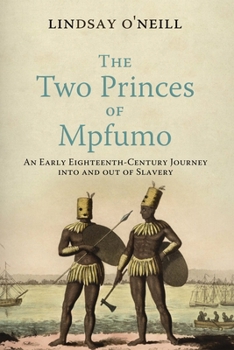The Two Princes of Mpfumo: An Early Eighteenth-Century Journey Into and Out of Slavery
A fascinating account of two eighteenth-century princes from East Africa, their travels, and their encounters with the British Empire and slavery
In 1716 two princes from Mpfumo--what is today Maputo, the capital of Mozambique--boarded a ship licensed by the East India Company bound for England. Instead, their perfidious captain sold them into slavery in Jamaica. After two years of pleading their case, the princes--known in the historical record as Prince James and Prince John--convinced a lawyer to purchase them, free them, and travel with them to London. The lawyer perished when a hurricane wrecked their ship, but the princes survived and arrived in England in 1720. Even though the East India Company had initially thought that the princes might assist in their aspirations to develop a trade for gold in East Africa and for enslaved labor in Madagascar, its interest waned. The princes would need to look elsewhere to return home. It was at this point that members of the Royal African Company and the Society for Promoting Christian Knowledge took up their cause, in the hope that profit and perhaps Christian souls would follow. John would make it home, but tragically, James would end his own life just before the ship sailed for Africa. In The Two Princes of Mpfumo, Lindsay O'Neill brings to life individuals caught up in the eighteenth-century slave trade. O'Neill also shows how the princes' experiences reflect the fragmented, chaotic, and often deadly realities of the early British empire. A fascinating and deeply researched historical narrative, The Two Princes of Mpfumo blurs the boundaries between the Atlantic and Indian ocean worlds; reveals the intertwined networks, powerful individuals, and unstable knowledge that guided British attempts at imperial expansion; and illuminates the power of African polities, which decided who lived and who died on their coasts.Format:Hardcover
Language:English
ISBN:1512827207
ISBN13:9781512827200
Release Date:February 2025
Publisher:University of Pennsylvania Press
Length:200 Pages
Weight:1.00 lbs.
Dimensions:0.6" x 6.0" x 9.0"
Customer Reviews
0 rating





